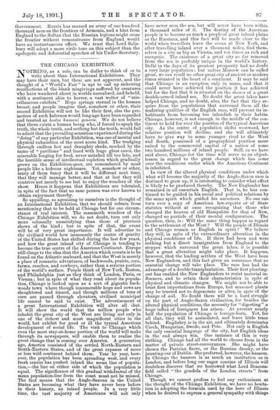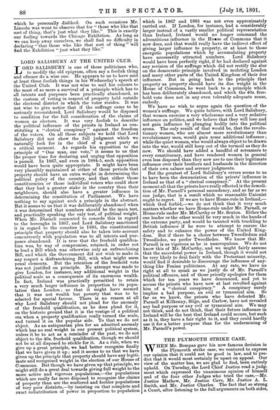THE CHICAGO EXHIBITION.
NOTHING, as a rule, can be duller to think of or to write about than International Exhibitions. They may have their uses, but these are not apparent, and the thought of a "'World's Fair" is apt to call up sickening recollections of the blank misgivings suffered by creatures who have wandered about in worlds unrealised, and beheld, with a sentiment akin to horror, a vast welter of " mis- cellaneous exhibits." Hope springs eternal in the human breast, and people imagine that, somehow or other, their second Exhibition will not be like their first, else the pro- moters of such Infernos would long ago have been regarded. and treated as hostes humani generis. We do not believe that there exists a human being who, if forced to speak the truth, the whole truth, and nothing but the truth, would fail to admit that the prevailing sensation experienced during the "doing" of any particular Exhibition, was one of mental and physical exhaustion of the most acute kind. The trudging through endless hot and draughty sheds, mocked by the name of " pavilions " and lined. with huge glass cases, the miserable longing for food, never satisfied till too late, and the horrible sense of intellectual repletion which gradually grows on the Exhibition-goer, are remembered by most people like a hideous nightmare. Yet, somehow or other, many of them fancy that it will be different next time, that they will manage better, and that at last they will contrive not merely to see but to enjoy the wonders of the show. Hence it happens that Exhibitions are tolerated, in spite of the fact that no sane person was ever known to obtain enjoyment thereby. So appalling, so agonising to ourselves is the thought of an International Exhibition, that we should refrain from mentioning that to be held at Chicago but for one circum- stance of real interest. The mammoth wonders of the Chicago Exhibition will, we do not doubt, turn out only more colossally unsatisfying than those of previous shows of the kind ; but in spite of that, the event will be of very great importance. It will advertise to the civilised world how immensely the centre of gravity of the United States has shifted during the last few years, and how the great inland city of Chicago is tending to become the true centre of the American Continent. Europe still clings to the idea that the America which counts is to be found on the Atlantic seaboard, and that the West is merely a place of romantic adventures, of backwoods, prairie, corn, farms, ranches, and cowboys, rather than a serious portion of the world's surface. People think of New York, Boston, and Philadelphia just as they think of London, Paris, or Vienna ; but in spite of what they read about its popula- tion, Chicago is looked upon as a sort of gigantic back- woods town where though innumerable hogs and cows are slaughtered and tinned, and though millions of tons of corn are passed through elevators, civilised municipal life cannot be said to exist. The advertisement of a great International Exhibition will alter all that. It will show the world that the million people who inhabit the great city ef the West are living not only in one of the richest and most magnificent cities in the world, but exhibit for good. or ill the typical American development of social life. The visit to Chicago which even the most stay-at-home portion of the world will make through its newspapers, will enable them to realise the great change that is coming over America. A generation ago, America consisted of the settled North-Eastern and South-Eastern States, and of the great expanse of more or less wild continent behind them. Year by year, how- ever, the population has been spreading west, and every fresh census has pushed inland the mean line of popula- tion,—the line on either side of which the population is equal. The significance of this gradual withdrawal of the mean population-line from the coast must not be missed. The fact means that the Anglo-Saxons in the United States are becoming what they have never been before in their history, an inland people. In a very little time, the vast majority of Americans will not only have never seen the sea, but will never have been within a thousand miles of it. The destiny of the American people is to become as much a people of great inland plains as the Russians, and this fact will be made clear to the world when travellers leave the ocean at New York, and after travelling inland over a thousand miles, find them- selves in a city as big as Vienna, and ten times as rich and energetic. The existence of a great city so far removed from the sea is probably unique in the world's history. Delhi in the days of its greatest prosperity had no doubt a very large population ; but unless Moscow can be called great, we can recall no other great city of ancient or modern times situated in the heart of a continent. It may be said that Chicago is an exception only in name, and that it could never have achieved. the position it has achieved but for the fact that it is situated on the shores of a great double-armed inland sea. No doubt the great lakes have helped Chicago, and no doubt, also, the fact that they re- quire from the populations that surround them all the seafaring qualities of the English race, will prevent its in- habitants from becoming too inlandish in their habits. Chicago, however, is not enough in the middle of the con- tinent to hold for ever the position of the typical American city. As the centre of population shifts westward, her relative position will decline, and she will ultimately have to give way to some younger rival to the West and South, possessed of a geographical position more suited to the commercial capital of a nation of some two hundred millions of inland people. Still, as we have said above, Chicago for the time will serve as an object- lesson in regard to the great change which has come over the conditions under which the American Continent is inhabited.
In view of the altered physical conditions under which what will become the majority of the Anglo-Saxon race is destined to grow up, it is interesting to consider what effect is likely to be produced thereby. The New Englander has remained in all essentials English. That is, he has con- tinued to be guided in his social and political relations by the same spirit which guided his ancestors. No one can turn over a copy of American law-reports or of State statutes without at once recognising that those who changed the heaven of old Hampshire for that of New, changed no particle of their mental configuration. The question, then, is : Will the same thing happen in regard to the settlement of the West ? Will the people of Illinois and Chicago remain as English in spirit ? We believe they will, in spite of the extraordinary alteration in the physical conditions of life. If there had been and were nothing but a direct immigration from England to the steppes which surround. the great lakes, it is possible that a great alteration might take place. It happens, however, that the leading settlers of the West have been New Englanders, and this fact gives an assurance that no essential change will take place. The race has had the advantage of a double transplantation. Their first planting- out has enabled the New Englanders to resist material in- fluences, and to retain their characteristics in spite of physical and climatic changes. We might not be able to trust first importations from Europe, but seasoned plants may be trusted not to degenerate or alter, in spite of the change of soil. No doubt there will be a hard struggle on the part of Anglo-Saxon civilisation, for besides the altered physical conditions, the necessity for " digesting" a huge influx of foreigners has arisen. At present nearly half the population of Chicago is foreign-born. Yet, for all that, they will be assimilated, and leave little trace behind. Englishry is in the air, and ultimately dominates Czech, Hungarian, Swede, and Pole. Not only is English the only essential language of the city, but English ideas in the end always win. One instance of this is very striking. Chicago had all the world to choose from in the matter of private street-conveyances. She might have chosen the Parisian fiacre, or the Russian drosky, or the jaunting-car of Dublin. She preferred, however, the hansom. In Chicago the hansom is as much an institution as in London, and before long our eager cousins of Illinois will doubtless discover that we borrowed what Lord Beacon* field called " the gondola of the London streets " from Chicago.
Though we cannot profess to feel any enthusiasm at the thought of the Chicago Exhibition, we have no hesita- tion in adopting the formula used by the hero of Illinois when he desired to express a general sympathy with things which he personally disliked. On such occasions Mr. Lincoln was wont to observe that for " those who like that sort of thing, that's just what they like." This is exactly our feeling towards the Chicago Exhibition. As long as we can keep away ourselves, we shall find no difficulty in declaring " that those who like that sort of thing " will find the Exhibition " just what they like."



















































 Previous page
Previous page